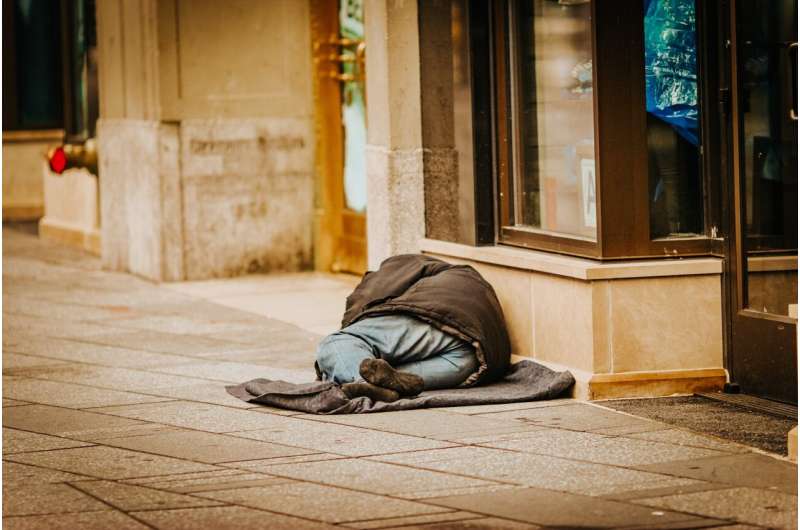This article has been reviewed according to Science X's editorial process and policies. Editors have highlighted the following attributes while ensuring the content's credibility:
fact-checked
trusted source
proofread
Study says reducing homelessness by 25% could save thousands of lives from dying by overdose

Reducing homelessness by 25% could save almost 2,000 lives lost to opioid overdoses, according to new research from the University of Georgia.
Published by Health Affairs, the study is the first to suggest that increased homelessness likely causes increased overdose deaths from drugs and alcohol.
The researchers also found that reducing homelessness by a quarter could save 850 lives from alcohol poisoning and 540 from cocaine overdoses. (Due to the nature of addiction, some of these lost lives may overlap.)
"One of the frustrations for people who study and recommend policy changes is that homelessness and the opioid crisis are persistent," said David Bradford, co-author of the study and a professor in UGA's School of Public and International Affairs. "Our study shows that there is a causal effect. Homelessness is making the opioid crisis worse."
However, strengthening social safety nets and increasing housing security could help curb growing deaths from drug and alcohol poisoning.
Homeless, overdose death counts likely higher now due to pandemic
The researchers analyzed Department of Housing and Urban Development (HUD) data on the number of homeless individuals in the U.S. from 2007 through 2017 and compared it with death certificates from the Centers for Disease Control and Prevention that attributed deaths to alcohol poisoning or drug overdose.
The researchers found that even a small decrease in homelessness could save lives. For example, even a 10% decrease in homelessness could save more than 650 people from dying from an opioid overdose.
"That's a lot of lives," said Felipe Lozano-Rojas, co-author of the study and an assistant professor in the School of Public and International Affairs. "Deaths from opioids used to be a rare event, but it has become increasingly prevalent."
The pandemic hasn't helped. With the end of the eviction moratorium in 2021, evictions have skyrocketed in the past few years. Almost 200,000 more individuals were unhoused in HUD's 2023 data than the last year of the study period.
And that increase in homelessness is likely to lead to an increase in accidental drug and alcohol deaths, according to the researchers.
"The increase in homelessness that we've seen since COVID-19 is probably a significant factor in the increase in opioid-related deaths we've seen since COVID started," Bradford said. "If you want to make progress fighting the opioid epidemic, tackling homelessness is one route to do that."
Addressing homelessness first may curb addiction
Preliminary evidence from other studies suggests taking a housing-first approach to the dual pandemic of homelessness and opioid addiction may help, according to the researchers.
That would mean focusing on keeping people in their homes first and addressing any addiction issues second.
For example, a previous study from Bradford and Ashley Bradford of Georgia Tech found that higher eviction rates were linked to higher rates of drug and alcohol deaths at the county level. Fewer evictions could mean fewer overdose deaths.
But solving the homeless and opioid crises is not as simple as just banning evictions. Landlords have to get paid. A tweak to current housing policies could help, though.
The researchers said something as simple as preventing evictions from happening through small claims court can help keep people in their homes, as can prohibiting retaliatory actions from landlords when their tenants report housing law violations.
"It took us decades to get into this problem, and it will take decades to get out of it," Bradford said. "What I hope people can take away from studies like ours is that we need pragmatic policies that aren't puritanical or judgmental. We need to invest in these people who need help.
"If you give them a chance, they'll surprise you, and they'll do well."
More information: W. David Bradford et al, Higher Rates Of Homelessness Are Associated With Increases In Mortality From Accidental Drug And Alcohol Poisonings, Health Affairs (2024). DOI: 10.1377/hlthaff.2023.00951





















